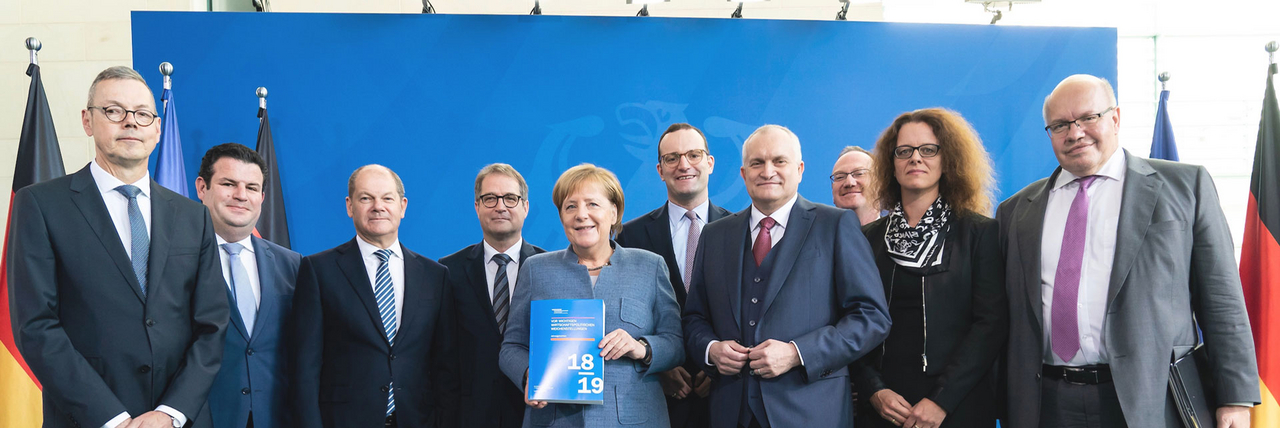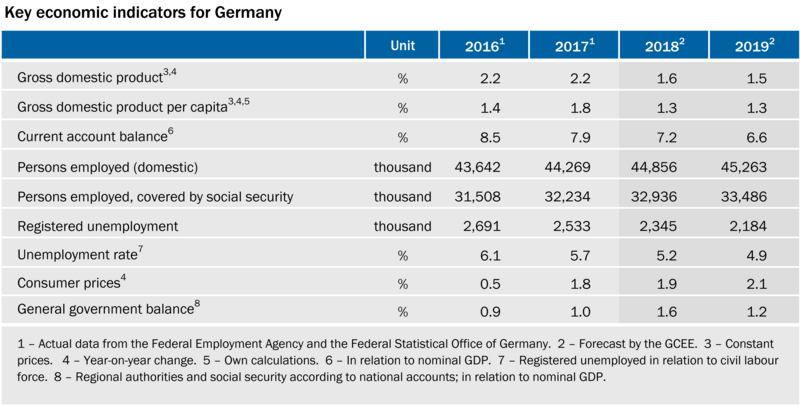Press release
The German Council of Economic Experts (GCEE) is presenting its Annual Report 2018/19 to the federal government today. The report carries the title:
Setting the right course for economic policy
Wiesbaden, 7 November 2018.
The German economy is maintaining one of its longest upswings in the post-war period. However, a less favourable foreign trade environment, temporary production issues and capacity bottlenecks are slowing the pace of expansion. The growth rate of gross do-mestic product (GDP) is likely to gradually adjust in the direction of potential growth. The GCEE forecasts real GDP growth rates of 1.6 % and 1.5 %, respectively, for the years 2018 and 2019.
“The uncertain future of the global economic order and unavoidable demographic change represent major challenges to the German economy. This requires setting the right course for economic policy,” said GCEE-Chair Christoph M. Schmidt.
The EU should oppose protectionist tendencies. Its strategy should include retaliation measures under WTO rules, conclusion of new free trade agreements and a strengthening of the multilateral rule-based trading system.
Germany should confront fiercer international tax competition and completely eliminate the solidarity surcharge. It should also consider creating a patent box. The discussed proposals for taxing digital companies are to be rejected.
Preventing Brexit remains the best solution. If this is not possible, efforts should be made to negotiate a follow-up agreement that minimises the damage for both sides. Brexit is an opportunity to focus EU finances on European added value.
The European Central Bank needs to manage the transition to a normal monetary policy successfully in order to stabilise the euro area. There is a risk that the turnaround in monetary policy will be too late. As regards macroeconomic stabilisation, national fiscal policy plays an important role. A reform of the fiscal framework would support this; a European fiscal capacity is not necessary. Credit and factor markets also play an important stabilising role. This would require a deeper European Banking and Capital Markets Union.
Concerning the high price momentum on the German real estate market, it would be advisable to take measures to expand the supply. Rent control merely addresses the symptoms but is not an effective solution. Reforming property tax and real estate transfer tax and increasing housing benefits are sensible measures to take. Social housing policies should be better designed.
Overcapacities in the healthcare system need to be reduced. Transition to a monistic system of hospital financing and expansion of cross-sectoral care provision offer efficiency potentials. Non-income-based additional contributions to health insurance and, in the long term, a flatrate per capita health insurance premium (Bürgerpauschale) with a mechanism for social compensation would promote competition.
Digitalisation contributes to reducing the impact of demographic change on labour force potential. People should be enabled to take advantage of the opportunities inherent in the digital transformation. This necessitates better framework conditions and a modern education system.
Demands are made for industrial policy interventions when structural change is visible and technological upheavals occur. In order to ensure long-term success, a location for innovation like Germany should refrain from interventionist industrial policy.
The German Council of Economic Experts is an independent academic body advising German policymak-ers on questions of economic policy. The Council consists of five members, currently Prof. Dr Christoph M. Schmidt (Chair), Prof. Dr Peter Bofinger, Prof. Dr Dr h.c. Lars P. Feld, Prof. Dr Isabel Schnabel, and Prof. Volker Wieland, Ph.D.
You can find the current Annual Report at: www.sachverstaendigenrat-wirtschaft.de
Contact: Birgit Hein, Office Manager, Tel. +49 611 75-2390, e-mail: presse@svr-wirtschaft.de

